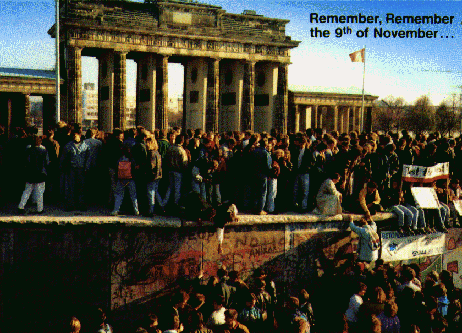

The reaction to the opening of the Wall is well known in the West. Enormous crowds gathered at the Brandenburg Gate, and at many other crossing points where the wall was breached. Thousands of East Germans crossed the border very soon after the Wall was open, where they were welcomed by enthusiastic West German well-wishers.
|  |
 | 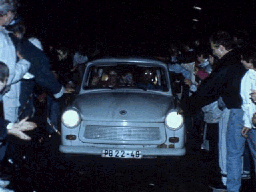 |
| Welcoming the Trabbis and their occupants, handshakes for all, an outpouring of spontaneous warmth | Patting the Trabbis (das Trabbiklopfen) as they drive cross over the border |
 | The Big Hug!Two women,who have not seen each other in many years embrace on meeting at the border, bringing home the cruelty and the artificiality of the Wall, the overwhelming joy at its irrevocable demise. |
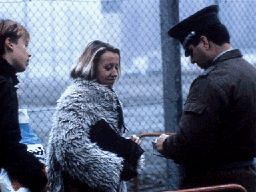 | 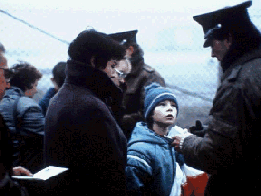 |
| East German woman crosses to West Berlin | Mother and son cross for the first time |
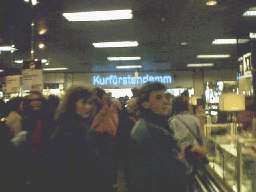 | 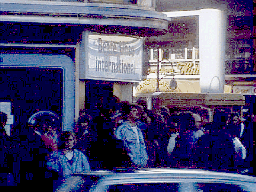 |
| Some shopped at the Kurfürstendamm... | Others at the local porn shop, Beate Uhse. |
Marlies Menge, a West German reporter, who writes about East Germany, wrote the following shortly after the Wall opened up.
"Twice before the Wall went down, my relatives tried to visit me,but in vain. Twice their application for a birthday visit had been rejected: I was too remotely related and not old enough for such a visit. Now they could cross over like millions of others, simply with their ID cards."
The same reporter got a letter from a woman who is a member of New Forum, one of East Germany's opposition groups in Rheinsberg, near East Berlin:
"We of the New Forum didn't even want to go at first, or stand on line for the 100 DM. Forget it! But our kids didn't want to be the only ones in school who hadn't been to the West" ... "We bought and carried back everything that we promised ourselves we wouldn't buy: jars of marmalade, candy, junk items, even beer and juice. It was a big load of stuff and in the evening we were totally tired, sank in to our own beds, glad to be back home. We all -including the kids -had the feeling that things were quieter, more solid, more understandable, more comfortable, and nicer here where we live."
End of letter.The letter continues: "We are simply used to it this way. The empty vegetable stores here in the East were one thing we noticed more, but to live continually in all of that hustle, all the advertisements, all the hype - we don't want that. We don't want to be a sort of imitation of the West, to have this quiet country flooded with trashy newspapers, sex-shops, videos, drugs, craziness and perversity. God protect us from that! Now that the border is open, our young people are already prey to these things. Lots of parents are afraid. Our impression is - that there is lots of diversity in the West, a lot of color and life, an abundance of goods, something for every budget, for every taste, for every obsession; that overall life there is very intense, but there is a certain something in the air that is indescribable, something develops in the souls of the people there in that affluent society that makes the atmosphere very different there than here."
Many of the Opposition like this lady are principled people from East Berlin, who are calling for a reformed socialism. This is a pretty safe thing to be calling for in the GDR because of the word "socialism". It has the effect of not calling crassly for western style democracy with a free market system. Another voice from East Germany, this time a man friend of Marlies Menge's, "
We are afraid that the capitalists are going to start buying us out at the rate of twenty East Marks to one West. Lots of them are already crouched on the starting blocks, and that is really bad."-- This fear is well-founded. West German fat cats are already scutting around, peering into everything in expectation of the largest fire sale ever. East Germans fear for their future.
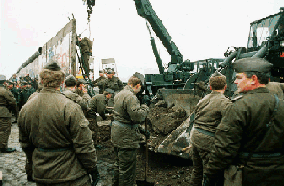 | 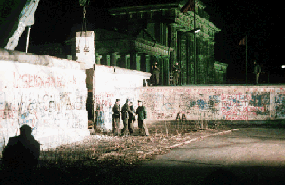 |
| Special crews of the East German Army worked all day... | ...and all night to open breaches in the Wall to accommodate the thousands who wanted to see West Berlin. |
Since the Fall of the Wall, the Communist Party, despite the defection of thousands of party members, made attempts at reforming itself. But the harder they tried, the faster party members quit. Average people are simply walking or driving away from East Germany or demonstrating continued opposition, no matter what the Party does.
The Opposition and the people in the streets demanded and achieved the disarmament of the Stasi. The Party then installed a new State Security Police called the "Nasi," the name of course betokening the height of good taste. The last Stasi document was number 3815, the first "Nasi" document was number 3816. Hardly a major change as far as the State Police bureaucracy is concerned, but the Stasi's 18,000 member goon-squad army has been disarmed. The disarmament of the Stasi is the single most important thing that has happened in East Germany since the Wall came down. The extent and depth to which the Stasi controlled the populace is just now coming to light. They are deservedly hated. Now that the Wall is down, the Stasi can not function and neither can the State that created it.
Two weeks after the Wall opened up, I called Ekhard Haack, my friend in West Berlin. It's wonderful, he said, but its also very sad. Sad for the hundreds of dead, the ones who were killed or broken, by the Stasi, or who died without hope. We talked about a friend of his, Wolfgang Harich, a talented literary critic, who rotted in prison for fifteen years, - for nothing - on charges trumped up by the Stasi to which he had to "confess" and denounce colleagues and friends. He is now a broken man.
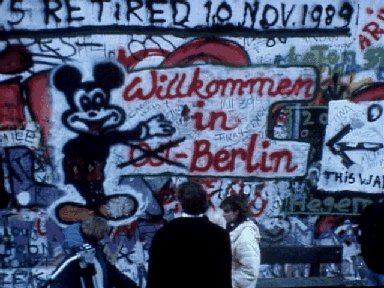
Proceed to 9. East German Problems or, switch to another Part:
1. Berlin at the End of WWII--Top of document
2: The First Postwar Decade
3. The Raising of the Wall
4. West Berlin thrives
5. East Berlin, a tourist attraction
6. East Germany during the Wall
7. Bringing down the Wall from within
8. East meets West
10. The Road to Unification